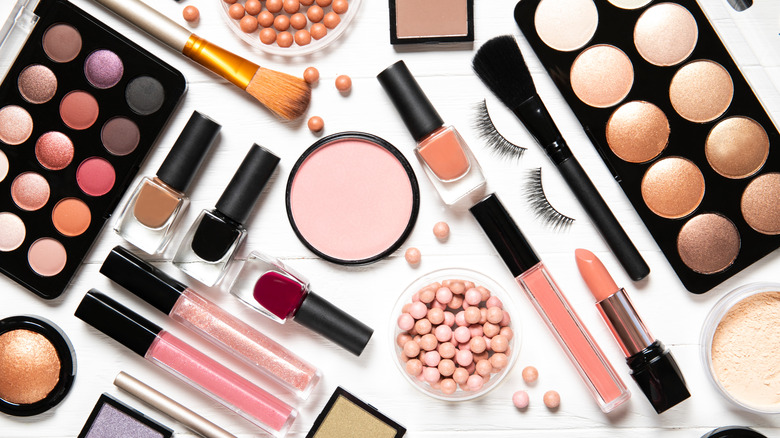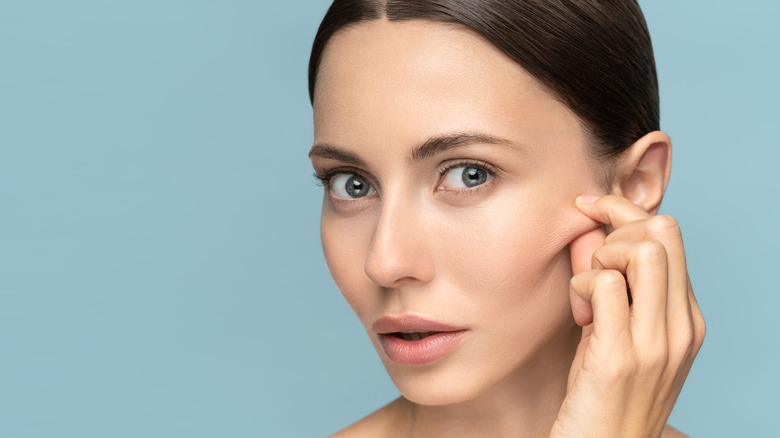Here's What You Should Know About Wearing Makeup With Eczema
Many people have a "getting ready" routine that they go through every morning before they leave the house. One part of many routines is putting on makeup to boost your confidence and make you feel good. But, for some, it's hard to apply makeup, or even find the right products, when their skin isn't at their best. For individuals with eczema, it can be hard to establish a regular routine and find basic products due to the sensitivity and irritation of the skin.
Eczema is the diagnostic name of conditions that lead the skin to become red, flaky, itchy, and sometimes painful (via the National Eczema Association). When people are diagnosed with eczema, they often are told to avoid specific products, foods, and chemicals to avoid hurting their skin even further. This can make it really hard to find the right beauty products, as the majority of them have dozens of ingredients and additives. Aside from standing in the beauty store reading every ingredient line-by-line, many feel hopeless when they're trying to simply put on a beauty look for the day.
However, not all hope is lost for those who have eczema! There are some ways to keep your skin pain-free and safe, while still rocking a great face beat.
Here's what to consider when shopping for makeup
As anyone with eczema knows, making sure your products aren't too harsh on your skin is important. Trial and error may work for some, but it can be a long road of errors that leave you in pain. Some have even tried products like honey to help with eczema, things can get that desperate. Instead, focus on trying to find the right products for your skin. Hydrating products are a great start when it comes to moisturizers, concealers, and foundations. Things with shea butter, glycerin, and lanolin are known to keep the skin hydrated and fresh. The more hydrated your skin, the less likely it is to flake and peel.
You should also avoid specific products and ingredients in makeup, too. Glycolic acid, salicylic acid, and retinol are three chemicals that are known to dry out the skin and should be avoided at all costs, as noted by WebMD. In addition, methylparaben or butylparaben are known to cause inflammation, which can be a stressor for anyone who already has inflammation from their eczema flair ups.
When shopping for any makeup and beauty products, you also want to avoid anything with a fragrance. While that lavender and vanilla smell so good, they can trigger reactions for sensitive skin. Experts say to buy products specifically "fragrance-free" and made for "sensitive skin."
Tips for using and applying makeup if you have eczema
Aside from buying the right products for your skin — one of the biggest reflections of your overall health — the way that you apply the makeup and how you use it also matters for people with eczema, according to InStyle. While makeup brushes are everyone's go-to, those with eczema should avoid using brushes altogether and opt for using their fingers instead. Why? Well, brushes are known to cause some irritation and friction on the skin, as noted by Get The Gloss. They're also known to trap in tons of bacteria, which can irritate eczema patches. For those who already have flaking and irritated skin, natural motions with the fingers are a safer bet. Use soft, pressing motions rather than rubbing, too.
A major reminder is to always remember to remove your makeup at night. After a long day, it can be hard to remember to thoroughly wash our faces and get everything off. But, leaving makeup on, even a little bit, can lead to more eczema flair ups and tons of chemical build up. It's important to use not only makeup removers that are targeted for sensitive skin, but also a cleanser to get below those pores and clean them out. For cleansers, oil based is better for eczema, because it'll keep the skin hydrated while also cleaning it (via InStyle).


